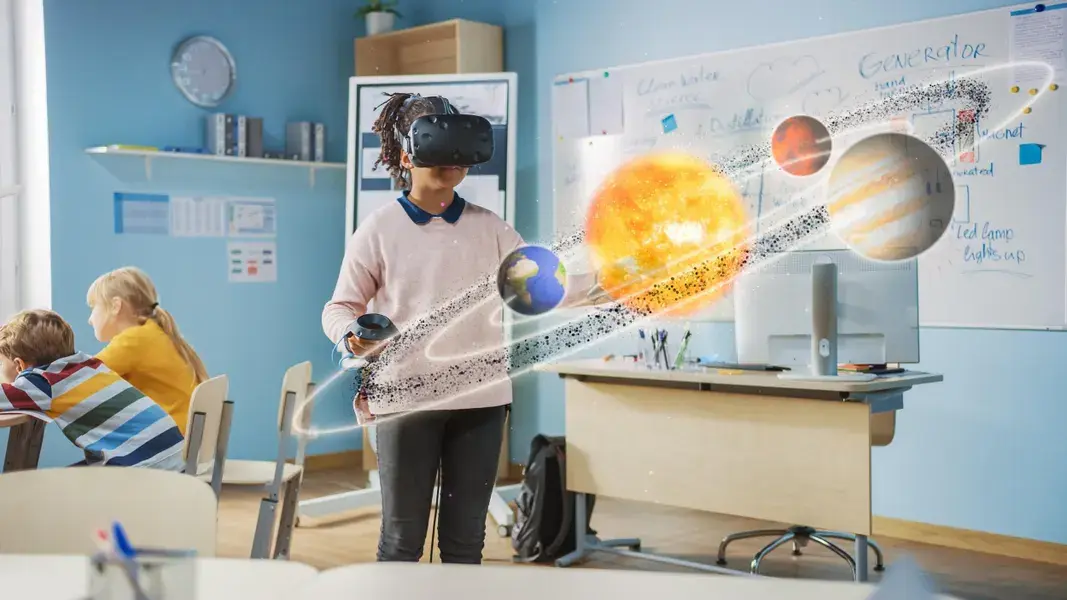The Impact of Digital Equity: Ensuring All Students Have Reliable Internet Access
The article discusses the importance of digital equity in ensuring all students have access to reliable internet and the skills to use it...
You must be logged in to the LATechNet portal to view additional resources.
3 min read
 Aria - LATechNet Team
:
Apr 11, 2025 6:02:54 AM
Aria - LATechNet Team
:
Apr 11, 2025 6:02:54 AM

The 'metaverse' is a virtual world or space where people engage with each other and digital environments using avatars, similar to characters in video games. Imagine a blend of virtual reality, augmented reality, and the internet, creating an immersive, interactive experience that feels real, even though it's entirely digital.
But why is this important for education? Well, as technology becomes more central in our lives, educators are always looking for new ways to help students learn in exciting and meaningful ways. Exploring the metaverse in education could open doors to engaging lessons, collaborative projects, and interactive learning experiences that traditional classrooms just can't offer. Understanding its potential helps teachers prepare for a future where digital and physical worlds blend seamlessly, making learning not only more accessible but also incredibly fun and engaging for students of all ages.
Imagine taking your students on immersive virtual field trips to ancient Egypt or letting them experience historical events firsthand. The metaverse makes such interactive learning possible, bringing lessons to life in ways traditional classrooms can't. According to a BBVA study, students are excited about this technology, with around 40% interested in metaverse-based education. However, teachers seem less enthusiastic, with only 18% expressing similar interest. Despite this gap, interactive experiences foster deeper engagement, boost motivation, and improve how well students remember lessons.
The educational metaverse is growing incredibly fast. Experts project the market will jump from $3.9 billion in 2024 to nearly $98 billion by 2034, growing at almost 38% per year. By 2028 alone, the global market could reach $19.3 billion. What's driving this growth? Mainly technological advancements, easier access to devices, and substantial investments from both private companies and public education sectors. Clearly, the education community sees potential in the metaverse as a valuable teaching tool.
From university campuses to K-12 classrooms, the metaverse is already making an impact. Meta recently donated 300 Quest 2 VR headsets to 15 universities across the U.S., showcasing how higher education institutions are adopting immersive technology. Meanwhile, younger students can collaborate globally, conduct virtual experiments, and explore complex projects more interactively. Vocational schools also benefit, using simulations to safely practice real-world scenarios, enhancing hands-on training without physical risks.
Innovative educators are turning to virtual reality to teach complex topics like leadership and diversity. UNSW Sydney, for example, uses VR programs to help business students gain empathy by experiencing life through the eyes of marginalized groups. By providing immersive experiences, the metaverse can bridge educational gaps, encourage global collaboration, and improve accessibility—helping learners everywhere feel included, regardless of their background or location.
Despite the excitement, hurdles remain. Technology barriers like the cost of devices, robust internet connectivity, and reliable infrastructure can pose challenges, especially for under-resourced communities. Additionally, some educators are skeptical or unsure of how to effectively integrate these new tools, creating a need for training and support. Moreover, privacy and ethical concerns regarding data management, student safety, and digital literacy must be carefully addressed to ensure responsible use of the metaverse in education.
Embracing the metaverse in education may sound exciting, but schools often wonder where to start. That's exactly where LATechNet steps in. Specializing in IT services specifically designed for schools and educational institutions, LATechNet makes adopting new technologies like the metaverse feel easy and achievable.
Their team offers friendly consultations and thoughtful planning to smoothly integrate metaverse technologies into current classroom setups. From building a strong network and secure cloud computing solutions to managing devices and ensuring cybersecurity, LATechNet covers the technical groundwork so schools can focus more on teaching and less on troubleshooting.
Plus, understanding new tech can be tough at first. That's why LATechNet provides hands-on training and continuous support for teachers and administrators. With a commitment to innovation, flexibility, and safety, LATechNet helps schools confidently step into the future of immersive learning.
The metaverse holds exciting possibilities for transforming education, making learning more immersive, inclusive, and engaging than ever before. Imagine students exploring historic events firsthand, collaborating on projects from opposite sides of the globe, and developing skills through interactive virtual scenarios. These innovative experiences not only spark curiosity but also better prepare learners to tackle real-world challenges down the road. By embracing the metaverse, educators have an incredible opportunity to reshape the classroom, ensuring all students—no matter their background or location—can access meaningful, forward-thinking education. With thoughtful implementation, this technology promises to empower students, equipping them for success in an evolving world and guiding them confidently toward a bright, imaginative future.

The article discusses the importance of digital equity in ensuring all students have access to reliable internet and the skills to use it...

Virtual Reality (VR) is revolutionizing education by providing immersive and interactive learning experiences that enhance student engagement and...

The article discusses the transformative impact of educational technology in classrooms by 2025, highlighting tools like AI-powered tutors and...